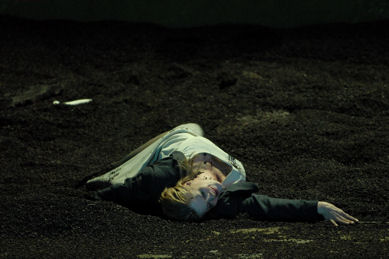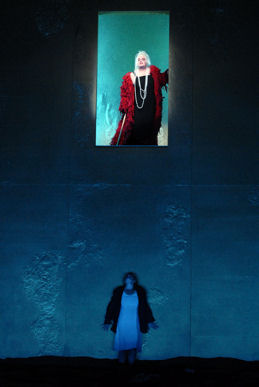Other Links
Editorial Board
- Editor - Bill Kenny
- London Editor-Melanie Eskenazi
- Founder - Len Mullenger
Google Site Search
SEEN
AND HEARD INTERNATIONAL OPERA REVIEW
Strauss,
Elektra:
Soloists, Chorus and Orchestra of the Deutsche Oper Berlin,
Leopold Hager (conductor) Dancers from the Ballet of the Deutsche
Oper Berlin, Deutsche Oper Berlin 14.12.2007 (MB)
For earlier performances, the Deutsche Oper had hit upon the
fascinating idea of preceding Elektra with Vittorio
Gnecchi’s Cassandra, known to Strauss and premiered four
years earlier in 1905 under Toscanini. Cassandra deals with
a preceding section of the myth of the accursed house of Atreus,
focusing upon Klytemnestra’s murderous revenge upon Agamemnon for
the sacrifice of their daughter Iphigenia, as foretold by the
ever-unheeded prophetess Cassandra. Sadly, the performance I could
attend was solely of Elektra, yet I tried nevertheless to
bear in mind the mythological context, with the result that the
characters’ hysterical derangement seemed slightly less arbitrary
than otherwise might have been the case. The curse of Pelops upon
his sons, Atreus and Thyestes, for the murder of Chrysippos, their
half-brother, reaches down to yet another generation.
Cast:
Klytämnestra – Jane Henschel
Elektra – Jeanne-Michèle Charbonnet
Chrysothemis – Claudia Iten
Aegisth – Burkhard Ulrich
Orest – Alfred Walker
Der Pfleger des Orest – Tomislav Lucic
Die Vertraute – Sarah Ferede
Die Schleppträgerin – Anna Fleischer
Ein junger Diener – Paul Kaufmann
Ein alter Diener – Jörn Schümann
Die Aufseherin – Stephanie Weiss
Erste Magd – Nicole Piccolomini
Zweite Magd – Julia Benzinger
Dritte Magd – Ulrike Helzel
Vierte Magd – Andion Fernandez
Fünfte Magd – Jacquelyn Wagner
Production:
Kirsten Harms (director)
Bernd Damovsky (stage design and costumes)

Bernd Damovsky’s set, simple but not abstract, focused attention
upon the bestial existence Elektra has led since the murder of
Agamemnon. Banished from what passes for human society in the

Leopold Hager’s excellent conducting assisted greatly in
permitting Charbonnet to accomplish this. A conductor who never
quite seems to have gained the regard his due, and perhaps best
known for his Mozart, Hager was quite at home with the exigencies
of the score. Whilst in the final reckoning this reading may have
lacked the razor-sharp attention to line and to colouristic
extravagance of a Christoph von Dohnányi, I have rarely heard the
crucial dance element to so much of the music brought out so
tellingly, especially in the run up to Elektra’s final, wild dance
itself. We are not nearly so far from Der Rosenkavalier as
might be imagined. In this, of course, Hager was dependent upon
the strength of his orchestra, whose strings and brass in
particular impressed. The brass contribution to the coming of
Orest was crucial not only in identifying the mysterious stranger,
but also in underlying the Wagnerian sound of Fate, without which
the drama would seem merely sensational.
Jane Henschel is not the sort of artist to give so searingly nasty
a reading of Klytämnestra as, say, Felicity Palmer (whom I have
seen in
London
and
Amsterdam),
but the grotesquerie of this mother on her very last legs provided
compensation. This never tipped into caricature, but her
hysterical laughter duly horrified, upon momentarily regaining the
upper hand by having taunted her daughter with news of Orest’s
death. It focused more sharply what her words and vocal line had
already told us, proceeding from her dreams rather than seeming a
gratuitous addition to an already over-heated atmosphere. Burkhard
Ulrich’s Aegisth was suitably sinister, oozing malevolent decay,
yet once again without edging into caricature, as so often happens
in this small but crucial part. Alfred Walker presented a fine
Orest, absolutely secure in the role that Fate has allotted him,
beautiful and implacably strong of tone, and truly moving during
the revelation of his identity to Elektra. The orchestra’s role in
the Recognition Scene – essentially, following Wagner, as Chorus
to the protagonists – assisted them greatly. So much that could
not be said in words followed the moment of recognition. Also
deeply moving was Claudia Iten’s heartfelt Chrysothemis,
unconditional in her love for her afflicted sister, yet
appropriately horrified by Elektra’s plans.
Viewed as a whole, the performance took a little while to scale
the heights, or perhaps to plumb the depths, although it was never
less than very good. If I found myself desperately wishing for
Orest to arrive, even if only to introduce a male voice into the
world of sometimes shrill female hysteria, then that is doubtless
as it should be. From the moment of Orest’s arrival, everything
appeared to move up a gear; the working out of Fate was made
absolutely clear. The last half hour or so was almost unbearably
powerful. In this strange tragedy without catharsis, one cannot
but feel browbeaten by the end, but it would be unbearable in the
wrong sense, were this to have resulted from a bad or mediocre
performance. There was no question of that here, in what must be
accounted a considerable triumph for
Berlin’s
Deutsche Oper.
Mark Berry
Pictures © Barbara Auermueller
